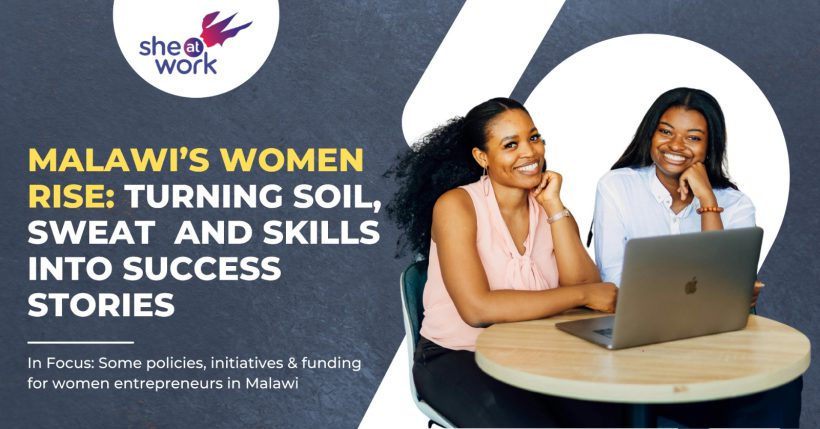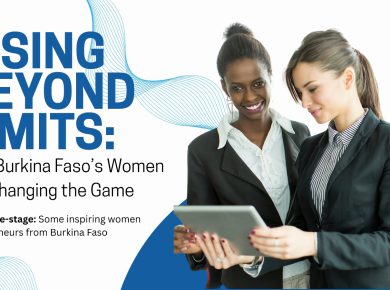In Focus: Some policies, initiatives and funding for women entrepreneurs in Malawi
#MalawiWomenRise #WarmHeartHustle #ShePowersMalawi #GrowWithHer #WomenInAgriBusiness
In Malawi, commonly known as “The Warm Heart of Africa” women entrepreneurs are turning passion into progress & ideas into impact. From rural farmlands to bustling urban centers, Malawian women are not merely surviving, but they are growing & building businesses that power households, feed communities & fuel economic growth.
Dominating the smallholder farming sector, women make up nearly 60% of Malawi’s agricultural labor force. These women grow staple crops like maize, rice & sweet potatoes (often for family consumption) and if there is any surplus, it is sold to support their homes. But the entrepreneurial spirit doesn’t stop at the soil. Many are stepping into agribusiness, creating value-added products such as organic soaps, detergents & processed foods. Others are boldly branching out into retail, technology & even male-dominated trades like butchery.
Empowering Malawi’s Women Entrepreneurs: How they are Shaping the Future
Despite their drive and determination, Malawian women entrepreneurs face steep challenges like – limited access to capital, restricted market access, high taxation, gender-based violence, and the unrelenting pressure of balancing business with domestic responsibilities.
Fortunately, change is in motion. With government policies like the National Agriculture Policy and Malawi Growth Development Strategy aligned with global SDGs, as well as support from NGOs and financial institutions, a growing ecosystem is being built to empower women entrepreneurs with the tools they need: funding, training, and market linkage.
Here, entrepreneurship isn’t just an economic tool – it’s a path to empowerment.
Let us now focus on some policies, initiatives and funding that is available for women entrepreneurs in Malawi.
- Malawi 2063 Vision
Tracing the history of one of the poorest countries in the world, Malawi has made important strides in reducing poverty and improving living conditions. The government released a long-term development strategy, Malawi 2063 Vision, aimed at achieving upper-middle income status by 2063.
The Malawi 2063 (MW2063) aims to transform Malawi into a wealthy and self-reliant industrialized ‘uppermiddle-income country’ by the year 2063. It is significant that projections indicate that if the economy grows at an annual average rate of six percent, Malawi will attain the low middle-income status by 2030.
As highlighted in a recently launched Malawi Gender Assessment, the country is unlikely to reach its ambitious goals without closing gender gaps in economic opportunities. Recognizing this, the government has put forth policy reforms – promoting women’s empowerment in education, health, protection from gender-based violence, employment and access to productive assets.
https://malawi.un.org/sites/default/files/2021-01/MW2063-%20Malawi%20Vision%202063%20Document.pdf
- National Industrial Policy (NIP)
In 2020 the Malawi Government embarked on institutionalization of a number of business and industrial reforms- in an attempt to mitigate challenges being faced by women entrepreneurs in the country.
The Government of Malawi implemented the National Industrial Policy (NIP) and National Trade Policy (2016 policies). The NIP aims to maximize domestic value addition and structural transformation which is a theme adopted at the continental level, the Tripartite and regional levels.
And the Government has instituted National Trade Policy – to address constraints on the supply side in order to grow the economy at national level. Actually, this was a move to set a new path for the structure of the economy. To shift from dominance by agriculture towards getting a larger share of manufacturing in Gross Domestic Product (GDP).
The Ministry of Trade implemented a number projects with assistance from various development partners such as – the European Union, World Bank, United Nations Development Programme (UNDP), UK’s Department for International Development (DFID), United States Agency for International Development (USAID) among others.
The projects included the Enhanced Integrated Framework, Export promotions, the Micro, Small and Medium Enterprises Business Incubator, Malawi Enterprise Productivity Enhancement Project, Trade Related Facility and so on.
The projects were introduced – to provide capacity and technical support programmes to businesses including Small and Medium Enterprises, so that stakeholders can improve their knowledge and skills in value addition activities, as well as build linkages with both domestic and international markets.
Local entrepreneurs were encouraged to participate in the regional trade fairs and exhibitions, which could create a platform to integrate into regional value chains and overcome some supply side constraints.
- Women Entrepreneurs Finance Initiative (We-Fi)
The Women Entrepreneurs Finance Initiative (We-Fi) supports women entrepreneurs in a number of ways. This includes – scaling up access to financial products and services, building capacity, expanding networks, offering mentors, and providing opportunities to link with domestic and global markets.
The Women Entrepreneurs Finance Initiative (We-Fi) is a key programme aiming to expand lending to women-owned small and medium enterprises (WSMEs).
- Women Entreprenueurs Finance Initiative Trust Fund (We-Fi) Grant
The principal objective of this project is – to expand NBS Bank’s lending to the underserved women-owned and led small and medium enterprises (WSMEs) in Malawi, by enabling NBS Bank’s digital channels and agency banking to provide financial and non-financial services to WSMEs. A consulting firm is recruited through a competitive bidding process, to deliver the Technical Assistance programme to the recipient. AfDB through the AFAWA programme will provide support in the procurement of a consulting firm to align with the Bank processes and procedures.
- Philip Morris International (PMI)
Philip Morris International (PMI) has been working in Malawi to provide women with a source of income & a path to independence. Through the creation of the Village Savings and Loans Associations (VSLAs), PMI empowers women in Malawi – by offering them the opportunity to create small, thriving businesses. One of these VSLA projects has been to supply women with mini drip-irrigation “starter kits,” also containing vegetable seed, fertilizer, and spray equipment, along with training and help with fencing – everything needed to create a thriving vegetable garden.
The programme was launched in July 2023, overcoming challenges such as – access to land (many women do not have available land, especially near a water source) and providing training in sparsely located groups or villages. The VSLAs were vital at this point because it allowed women to pool enough money – to buy land collectively, which many could not have done on their own.
They plan to expand the project sustainably, helping members to continue contributing to their household income, and offering the opportunity to explore additional business ventures, with recent examples being tea rooms, bakeries, grain trading, poultry farming, restaurants, and bicycle and motorbike taxis. In terms of numbers, they hoped to double the number of beneficiaries by the end of 2024.
- Zantchito programme
The Zantchito programme (Skills for Jobs) supports women entrepreneurs – with capacity building, networking, mentorship & visibility.
By strengthening and working with the incubator and business development services ecosystem to improve the quality of business education, the Zantchito Entrepreneurship and Access to Finance Pillar (part of the Zantchito Skills for Jobs Programme funded by the European Union and the United Nations Development Programme, and implemented by Cadmus UK international) – uses a market systems approach to encourage the development of more stable, growth-oriented enterprises within the country.
The project will work with the Government, the TVET agencies, private sector and their representatives and with four colleges, which will become sector specific centres of vocational excellence for training learners and trainers.
The project will draw on UK and international expertise to make a significant improvement in the quality, relevance and inclusiveness of the Malawi TVET system; and will also act as a catalyst for sharing good practice and promoting innovation through South-south collaboration.
https://www.britishcouncil.org/education/skills-employability/programmes/zantchito-skills
- Academy for Women Entrepreneurs (AWE) Programme
This programme, supported by the US Embassy in Lilongwe, offers capacity-building business skills & mentorship to women entrepreneurs.
The Academy for Women Entrepreneurs (AWE) is an initiative of the US State Department’s Bureau of Educational and Cultural Affairs (ECA). This was developed to support the White House-led Women’s Global Development and Prosperity (W-GDP) Initiative which aims to empower 50 million women worldwide by 2025 – to fulfil their economic potential, creating conditions for increased stability, security, and prosperity for all.
Women entrepreneurs nationwide will be selected for an opportunity to acquire capacity strengthening business skills and mentorship.
Despite the country having faced a challenging and deteriorating macro-economic and enabling environment, Zantchito is aware of a large, committed group of genuine entrepreneurs wishing to establish and grow their business ideas through the pre-incubation and incubation phases of the programme. Overcoming challenges, these entrepreneurs looking at starting their entrepreneurial journey. They have shown significant interest and willingness to further adapt their ideas, plans and approaches – to address these new challenges as they have gone through the incubation process.
As Malawi navigates its economic recovery, these early lessons from the Zantchito Entrepreneurship programme actually provide a foundation – for building a new generation of innovative, inclusive and growth-oriented enterprises.
https://www2.fundsforngos.org/women-gender/academy-for-women-entrepreneurs-awe-program-malawi
- National Association of Business Women (NABW)
National Association of Business Women (NABW) was formally established in 1990, as an NGO aiming to uplift the socioeconomic status of women in Malawi, through various business activities and to address women’s challenges. NABW has a membership of 3000. NABW is also the national chapter for Federation of National Associations of Women in Business in Eastern and Southern Africa (FEMCOM) in Malawi.
NABW training targets its membership, and the participants in these trainings are often drawn from its membership. For one to be a member of NABW, she has to be a business owner. It does not matter whether the business is registered or not. NABW’s annual membership fee K10, 000.
Other services that NABW provides to its membership are:
- Capacity building: to enhance the technical and business skills of women across multiple functions and platforms to enable them to better manage and grow their businesses
- Access to market: to enhance the competitiveness of women entrepreneurs towards increasing their market share
- Access to financing and resource mobilization: to increase access to loans by women
- Advocacy and lobbying: to lobby/advocate policy review in trade that will promote women participation to ensure actual review and development of policies affecting women entrepreneurs
And, through its membership, NABW operates as:
- A business and market development catalyst – byproviding members with access to markets, production, financial and other resources through well-developed and executed intermediary services; an active advocate in both national and international forums for policies and programs which benefit women and result in increased business and enterprise pportunities for women.
- A partner to government in identifying, analyzing and developing policy and program options regarding economic empowerment through business and enterprise development opportunities for women.
- The primary source of information & insight on issues related to women in business and their roles, contributions and participation in Malawi’s economic development.
There several events that NABW organizes and facilitates for its membership. These events include:
- Business trainings: NABW offers business management training, financial management and marketing skills to its members
- Trade fairs: NABW facilitates its members in trade fairs both locally and internationally. It also facilitates exchange visits within/outside the country for its members to increase their capacity through sharing ideas with their counterparts
- Business information sessions: NABW provides information to its members on access to finance and availability of markets for products
- Africa Trust Group (ATG)
An organization working in the SADC region, Africa Trust Group (ATG), has partnered with Enygma Ventures to financially support Malawian women who have existing businesses and those with business ideas.
ATG extended their operations in Malawi because they had seen several women entrepreneurs working hard to finding solutions to tough challenges through business.
But regionally, women still have less access to funding a development which resulted into losing of up to $95billion in productivity every year just because women are not fully included in economic activities.
The organization has since encouraged women in the country to join government on economic recovery and growth by becoming serious entrepreneurs through their scholarships to business development programs and funds.
Malawian women entrepreneurs, who have good business ideas but lack capital and those with existing businesses need to apply for funding.
https://malawi24.com/2021/02/10/organisation-seeks-to-support-malawi-women-entrepreneurs
- COMFWB Malawi
COMFWB Malawi is a Federation of business women in Malawi. Their objectives are – promoting programs that
(a) integrate women into Trade and development activities in all sectors of entrepreneurship,
(b) improve the economic conditions of women and
(c) increase awareness of women in development activities and policies affecting them.
COMFWB implements special programmes for women small, medium, and micro enterprises (SMMEs) which creates or support them to have access to Markets, finance and technologies. With this support, SMMEs become competitive and able to effectively participate in the Regional Common Market.
Their Strategic Goals for the coming 3 years for the Chapter include:
(i) Organization growth and Development;
ii) Development of Women, their products and Enterprises;
iii) Create opportunities for women access to affordable finance;
iv) Linkages and Networking with organization with same objectives in Women economic empowerment
(v) Advocacy; and
vi) Creating opportunities to access to market for members (who are women in business groups, women led and owned Associations and Cooperatives in various entrepreneurship sectors across Malawi).
https://www.comfwb.org/member/malawi
- National Bank of Malawi
Having more than 30 branches across the country, National Bank of Malawi has SME targeted facilities and in August 2019 it launched a facility for women entrepreneurs.
Lady Entrepreneur Facility: This product specifically targets women entrepreneurs, offering them a window to access loans up to MK5,000,000.00 without collateral.
SME Business Finance: To assist qualifying Small and Medium Enterprises (SMEs) with working capital, capital expenditure finance, short term loans, letters of credit, guarantees and bonds. Target market includes both sole proprietorships and limited companies that have sales turnover of up to K 100, 000,000 running or intend to run any business which is not on the bank’s negative list.










